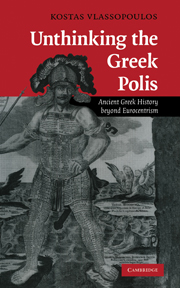Book contents
- Frontmatter
- Contents
- Acknowledgements
- Abbreviations
- Introduction
- PART I DEFINING THE CONTEXTS OF THINKING ABOUT THE POLIS
- 1 An archaeology of discourses
- 2 The ancient discourses on the polis
- 3 Making use of Aristotle: concepts and models
- PART II RETHINKING THE CONTEXTS. THE POLIS AS AN ENTITY: A CRITIQUE
- PART III BEYOND THE POLIS: THE POLIS AS PART OF A SYSTÈME-MONDE
- References
- Index
2 - The ancient discourses on the polis
Published online by Cambridge University Press: 22 September 2009
- Frontmatter
- Contents
- Acknowledgements
- Abbreviations
- Introduction
- PART I DEFINING THE CONTEXTS OF THINKING ABOUT THE POLIS
- 1 An archaeology of discourses
- 2 The ancient discourses on the polis
- 3 Making use of Aristotle: concepts and models
- PART II RETHINKING THE CONTEXTS. THE POLIS AS AN ENTITY: A CRITIQUE
- PART III BEYOND THE POLIS: THE POLIS AS PART OF A SYSTÈME-MONDE
- References
- Index
Summary
It is time to discuss how the ancient Greeks themselves thought about the polis, to see if their thought can support the modern uses that have been made out of it. My discussion will focus on Aristotle's Politics, since this text has provided most of the ideas underlying the conceptualisation of the polis. Aristotle does not represent the communis opinio of ancient Greeks, but his text is the only complete ancient Greek text surviving that gives us a context of ancient discourses on the polis. I will attempt to understand Aristotle's work on its own terms and in its own context; I will then try to show that many of his ideas face in a different direction from that of much modern research and many an orthodox view.
But there is an obvious limit to this attempt. The aims of Aristotle, or, put in different words, the discursive presuppositions of his genre, are very different from my own and my own genre's, which is of course history. Aristotle had an impressive knowledge, and made impressive use of the past, but his approach is not a historical one. Robert Nisbet, in a book written long ago, has shown the unbridgeable gap between the vision of history and the vision of developmental and evolutionary approaches to the past; moreover, he has shown that the general premises of this evolutionary and developmental approach to the past, which can be clearly recognised in Aristotle, are still shared by the body of social and anthropological thinking of Europe, even in the twentieth century.
- Type
- Chapter
- Information
- Unthinking the Greek PolisAncient Greek History beyond Eurocentrism, pp. 68 - 84Publisher: Cambridge University PressPrint publication year: 2007



